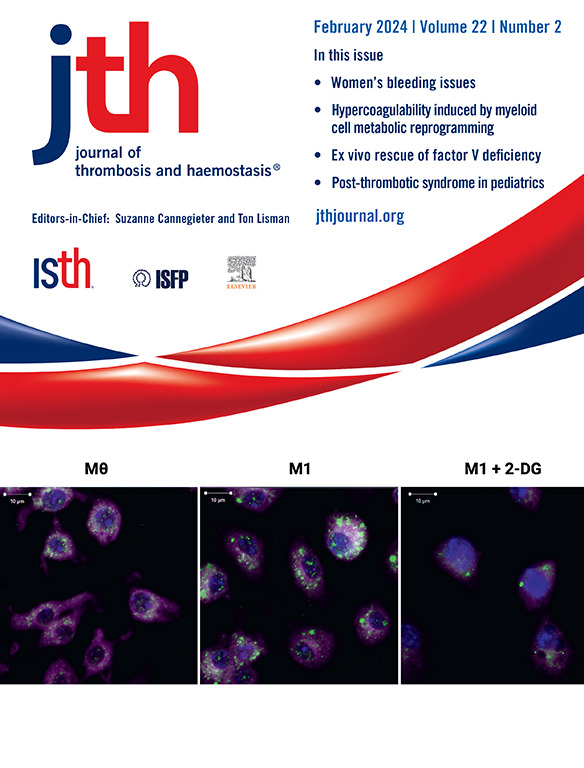Long-term FXa inhibition attenuates thromboinflammation after acute myocardial infarction and stroke by platelet proteome alteration
IF 5.5
2区 医学
Q1 HEMATOLOGY
引用次数: 0
Abstract
Background
Immediate activated factor (F)X (FXa) inhibition exerts direct antiplatelet effects in the context of arterial thrombosis but little is known about the impact of long-term therapy on platelet function in ischemic cardiovascular diseases.
Objectives
Therefore, we analyzed platelet-derived effects of long-term FXa inhibition in the setting of acute myocardial infarction (AMI) and stroke.
Methods
We evaluated the effect of acute versus chronic FXa inhibition on thromboinflammation following AMI and stroke in mice in vivo. Mechanistically, we identified changes in platelet gene expression and proteome under chronic FXa nonvitamin K antagonist oral anticoagulant treatment and characterized its functional consequence on platelet physiology. In a prospectively recruited cohort of patients with AMI, we determined cardiovascular magnetic resonance based cardiac endpoints under FXa nonvitamin K antagonist oral anticoagulant effects on clinical endpoints in a cohort of patients with AMI.
Results
Chronic but not acute FXa inhibition reduced cerebral and myocardial infarct size and improved cardiac function 24 hours after AMI in mice. Mechanistically, we identified an attenuated thromboinflammatory response with reduced neutrophil extracellular trap formation in mice and patient samples. Proteome and RNA expression analysis of FXa inhibitor treated patients revealed a reduction of key regulators within the membrane trafficking and secretion machinery hampering platelet α and dense granule release. Subsequent, thromboinflammatory neutrophil extracellular trap density in thrombi isolated from stroke and myocardial infarction patients was reduced. Patients with AMI treated with FXa inhibitors showed decreased infarct size after myocardial infarction compared to patients without anticoagulation treatment.
Conclusion
Long-term FXa inhibition induces antithromboinflammatory proteome signatures in platelets, improving infarct size after myocardial infarction and stroke.

通过改变血小板蛋白质组,长期抑制 FXa 可减轻急性心肌梗死和中风后的血栓性炎症。
背景和目的:在动脉血栓形成的情况下,Xa因子(FXa)即刻抑制可发挥直接的抗血小板作用,但长期治疗对缺血性心血管疾病中血小板功能的影响却知之甚少:我们在小鼠体内评估了急性心肌梗死(AMI)和中风后急性和慢性 FXa 抑制对血栓素炎症的影响。从机理上讲,我们确定了慢性 FXa NOAC 对血小板基因表达和蛋白质组的影响,并描述了其对血小板生理功能的影响。在前瞻性招募的一组急性髓系白血病患者中,我们确定了在 FXa NOAC 对一组急性髓系白血病患者临床终点的影响下基于 CMR 的心脏终点:小鼠急性心肌梗死 24 小时后,慢性而非急性 FXa 抑制可缩小脑梗死和心肌梗死面积,改善心脏功能。从机理上讲,我们发现小鼠和患者样本中的血栓炎症反应减弱,NET形成减少。对接受 FXa 抑制剂治疗的患者进行的蛋白质组和 RNA 表达分析表明,膜贩运和分泌机制中的关键调节因子减少,阻碍了血小板α和致密颗粒的释放。随后,从中风和心肌梗死患者体内分离出的血栓中血栓炎性 NET 密度降低。与未接受抗凝治疗的患者相比,接受 FXa 抑制剂治疗的急性心肌梗死患者在心肌梗死后的梗死面积有所缩小:结论:长期 FXa 抑制剂可诱导血小板中的抗血栓炎症蛋白组特征,从而改善心肌梗死和脑卒中后的梗死面积。
本文章由计算机程序翻译,如有差异,请以英文原文为准。
求助全文
约1分钟内获得全文
求助全文
来源期刊
CiteScore
24.30
自引率
3.80%
发文量
321
审稿时长
1 months
期刊介绍:
The Journal of Thrombosis and Haemostasis (JTH) serves as the official journal of the International Society on Thrombosis and Haemostasis. It is dedicated to advancing science related to thrombosis, bleeding disorders, and vascular biology through the dissemination and exchange of information and ideas within the global research community.
Types of Publications:
The journal publishes a variety of content, including:
Original research reports
State-of-the-art reviews
Brief reports
Case reports
Invited commentaries on publications in the Journal
Forum articles
Correspondence
Announcements
Scope of Contributions:
Editors invite contributions from both fundamental and clinical domains. These include:
Basic manuscripts on blood coagulation and fibrinolysis
Studies on proteins and reactions related to thrombosis and haemostasis
Research on blood platelets and their interactions with other biological systems, such as the vessel wall, blood cells, and invading organisms
Clinical manuscripts covering various topics including venous thrombosis, arterial disease, hemophilia, bleeding disorders, and platelet diseases
Clinical manuscripts may encompass etiology, diagnostics, prognosis, prevention, and treatment strategies.

 求助内容:
求助内容: 应助结果提醒方式:
应助结果提醒方式:


